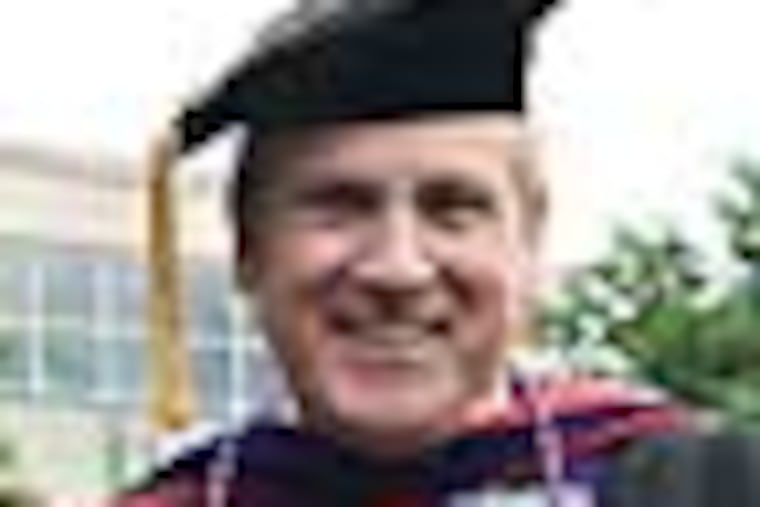Vietnam hero cures an old Rutgers wound
This time it was different for David Christian. Forty years ago, he attempted to pursue a law degree upon his return from Vietnam and rehabilitation in veterans' hospitals. He'd been through hell, and the last place he expected to face more of it was in academia. But the climate in the late 1960s and early '70s was often inhospitable to those who had served in Vietnam, even the most highly decorated.

This time it was different for David Christian.
Forty years ago, he attempted to pursue a law degree upon his return from Vietnam and rehabilitation in veterans' hospitals. He'd been through hell, and the last place he expected to face more of it was in academia. But the climate in the late 1960s and early '70s was often inhospitable to those who had served in Vietnam, even the most highly decorated.
The Bristol native first enlisted in the Army paratroopers at 17. He was the youngest second lieutenant in Army history (at 18), then the youngest first lieutenant and the youngest captain. His platoon earned a reputation as one of the Army's best reconnaissance units, nicknamed "Christian's Butchers."
On Oct. 29, 1968 (three days after his 20th birthday), Lt. Christian was in charge of the lead element of a reconnaissance-in-force mission 10 miles northwest of Quan Loi, near the mouth of the Ho Chi Minh Trail. During an attempt to skirt an enemy camp, Christian's nine-man unit came under heavy fire.
Cut off and low on ammunition, Christian and his men fought back with hand grenades, bayonets, and light antitank weapons. Rather than hunker down, Christian led his troops forward until they became pinned down 10 meters short of an enemy bunker. Disregarding his own safety, he assaulted the fortification alone and destroyed it with hand grenades. He was twice wounded in the four-hour engagement. When reinforcements arrived, he refused medical attention until his wounded men had been safely evacuated.
The wounds he sustained in Vietnam from many battles drove him into retirement at 21. He was shot in the back, chest, legs, and left arm. He was paralyzed in his right hand, received napalm burns on 40 percent of his body, and spent six years in hospitals recovering.
The Bucks Countian is one of America's most decorated veterans of any war. His service earned him seven Purple Hearts, the Distinguished Service Cross, two Silver Stars, a Bronze Star, the Air Medal, the Combat Infantryman's Badge, and two Vietnamese Crosses of Gallantry.
When he was sufficiently rehabbed so he could continue with his life, he graduated from Villanova University - it took him only 19 months - and then enrolled at the Rutgers University Law School in Camden in 1973.
But this was a different time. After a story was published about his heroism in Vietnam, Christian told me, his life "became hell."
Because of opposition to the Vietnam War and an antipathy toward those who served, Christian said, the faculty made a circus of his attempt to earn a law degree. "If I got a grade that was marginal, they would release it to the newspapers and news media," he said.
Christian said certain of the deans had disputed the existence and severity of his war injuries, many of which are not obvious. "I was asked by the administration to disrobe in front of the student body because they didn't think I was a disabled veteran," Christian said.
"At the time there was no Americans With Disabilities Act and there was no Privacy Act," he said. "They couldn't touch the politicians, but they could touch a war hero."
He said some faculty members would post lists of purported Vietnam heroes - lists that would include North Vietnamese names.
Amid the heckling, Christian was in constant pain, which required him to consume a steady diet of medication. The agony and endless treatments became a disruption to his studies and those of his classmates. He asked for consideration from the faculty and staff, he said, and got none.
"It was an unfriendly environment," he told me.
In the early 1970s, Christian dropped out of law school just a few credits shy of what was needed to graduate. Two years ago, his daughter Colleen contacted Rutgers to see if her dad could return.
"The new dean happened to be a Vietnam veteran, Rayman Solomon," Christian said. "He was shocked at this social tragedy. I didn't know if I wanted to come back. But people change. And the dean said that I could come back and take the remaining credits."
Christian was readmitted, studied for a year, and graduated Thursday at age 62. He credited Colleen and the late New Jersey Assemblyman Kenneth Gewertz for persuading him to finish what he had started so long ago.
"I had to raise my hand in class when everyone was using a personal computer," Christian said. "I asked to use a blue book and they looked at me like an antique.
"In July I will take the bar for the state of Pennsylvania and New Jersey. It has been a long, long road, but I am finished."